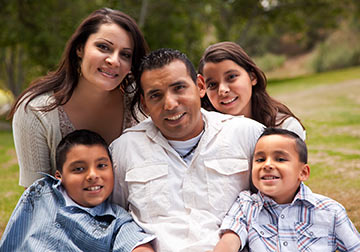Fiancé Visas & Fiancee's Children Visas: K-1 / K-2

In order for an applicant to petition for his or her fiancé or fiancée to enter the country, he or she must prove that:
- The applicant is a U.S. citizen.
- The applicant intends to marry within 90 days of the fiancé entering the United States.
- Both people are free to marry and any previous marriages have been legally terminated by divorce, death, or annulment.
- The couple met, in person, at least once within 2 years of filing the petition. There are two exceptions where this provision does not apply:
- If the requirement to meet would violate strict and long-established customs of one party's foreign culture or social practice.
- If the applicant proves that the requirement to meet would result in extreme hardship.
K-1 and K-2 Visas Overview: Fiancées & Children
A fiancé may enter the country under a K-1 visa. Basically, a K-1 visa enables a U.S. citizen to bring their foreign fiancé or fiancée to the United States for the purpose of marriage.
Equally important to many people seeking to bring a fiancé into the country, K-2 visas enable the foreign fiancé(e) to bring his or her unmarried children under the age of 21 into the United States. This promotes family unity, one of the underlying purposes behind most U.S. immigration laws. A K-2 visa holder (the child of a K-1 visa holder) is permitted to enter the U.S. up to one year after the issuance of the K-1; however, a K-2 visa holder may not enter the U.S. prior to the K-1 visa.
Application Procedures
When filing for a fiancé visa, the U.S. citizen must file a petition, Form I-129F, Petition for Alien Fiancé, with the USCIS Service Center that has jurisdiction over the place of the petitioner's residence in the United States. These petitions cannot be adjudicated abroad. USCIS will forward the approved petition to the U.S. consulate where the foreign national's fiancé will apply for the visa. These petitions are valid for only four months from the date of USCIS action; however, they can be revalidated by the consular officer.
What documents are required for the K-1 visa application?
- Valid passport
- Birth certificate
- Police certificate from all places lived since age 16
- Medical examination
- Evidence of valid relationship with the petitioner
- Photographs of the petitioner and the beneficiary
- Evidence of support
- Divorce or death certificate of any previous spouse
How long is the K-1 visa valid for before expiration?
The K-1 visa is valid for one entry for a period of six months. What this means is the nonresident fiance must enter the U.S. within six months or the visa will expire. Once he or she enters, the actual stay in the U.S. will only be for ninety days. The couple must then marry within the ninety day period.
 What happens after my fiancé(e) moves to the United States and we are married?
What happens after my fiancé(e) moves to the United States and we are married?
As previously noted, a couple has 90 days to marry after the K-1 visa holder's move to the United States. Upon marriage, the new spouse must apply for an Adjustment of Status, Form I-485, in order to become a permanent resident of the United States. If the spouse wishes to work, he or she may apply for an Employment Authorization Document (EAD). The EAD is required if the K-1 visa holder wishes to work in the country until the I-485 has been processed and approved. Additionally, if the K-1 holder wishes to travel outside the country before they receive their green card (I-485 approval), then they must also apply for "advance parole." Advance parole must be granted before a trip out of the United States. This is very important because if a K-1 visa holder leaves the country without first obtaining advance parole, then the K-1 visa will be deemed abandoned.
Then, if the I-485 is approved before two years from the time of marriage, a "Conditional" Permanent Resident status, or green card, will be issued. This is valid for two (2) years. If the approval comes beyond two years from the time of marriage, then full Permanent Residency with no conditions attached will result. This permanent residency will be valid for ten years. Please note that the amount of time to approve an I-485 varies depending upon the local USCIS office. Later on, a resident can apply to become a full American citizen. The citizenship application and approval process is called "naturalization." Go to our Ctizenship Through Naturalization page to read more on becoming a U.S. citizen.
Are there any limitations on K Visas?
There are some filing limitations for K non-immigrant petitioners. Notably, if a K-visa petitioner has filed two or more K-1 visa petitions at any time or has previously had a K-1 visa petition approved within the 2 years prior to filing their current petition, they must then apply for a waiver. Such waiver requests made by made by completing an I-129f petition and submitting documentation of the claim for the waiver.
Moreover, if the applicant has committed a violent offense against an individual or individuals, then the USCIS may choose not to grant the waiver. A waiver denial can occasionally be overcome through a showing of extraordinary circumstances.
Contact Us
If you are a family member seeking entry into the United States through an immigration service offered to families, please fill out the questionnaire below and an experienced immigration lawyer will contact you regarding your particular immigration matter. There is no obligation created by your submission of information. Immigration lawyers and law firms are available at all hours and will contact you to assist with any immigration concerns that you may have.